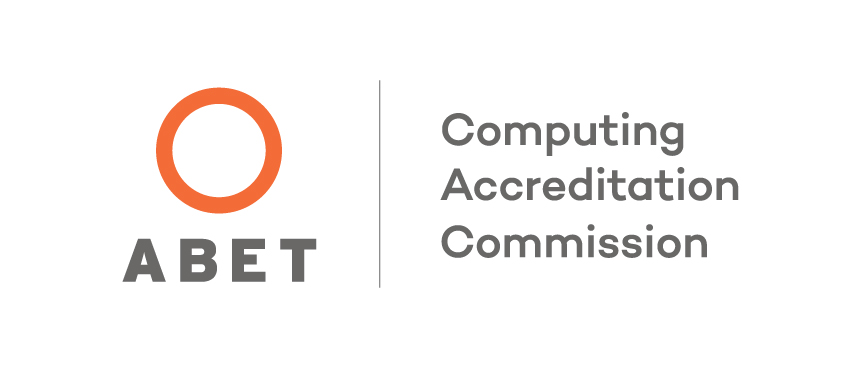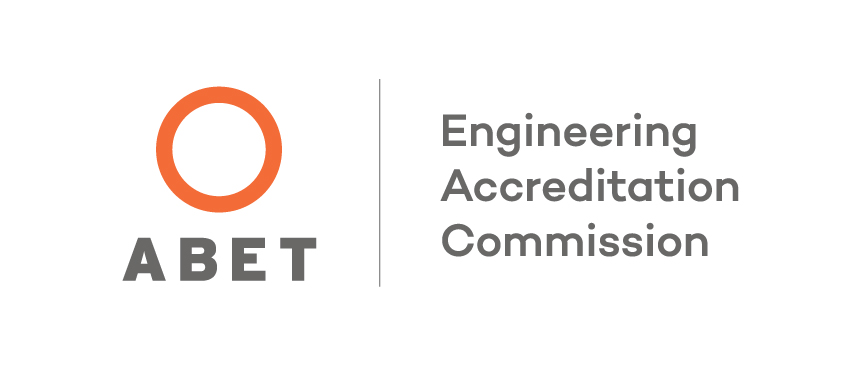- Home |
- Accreditation
Accreditation
The B.S. program in Computer Science is accredited by the Computing Accreditation Commission of ABET, https://www.abet.org, under the General Criteria and Program Criteria for Computer Science and similarly named computing programs.

Program Educational Objectives - B.S. Computer Science
The program’s educational objectives for the Bachelor’s degree in computer science are that within a few years after graduation, graduates are expected to:
- Demonstrate an understanding of computer science principles and an ability to solve unstructured computer science problems through the successful entrance into and advancement in the computer science profession.
- Demonstrate an appreciation for lifelong learning and for the value of continuing professional development through participation in graduate education, professional education or continuing education opportunities, attainment of professional license, or membership in professional societies.
- Demonstrate an understanding of professional and ethical responsibilities to the profession, society and the environment incumbent on a computer science professional.
- Successfully interact with others of different backgrounds, educations, and cultures.
- Demonstrate effective communication skills in their profession.
Student Outcomes
The Computer Science program enables students to attain, by the time of graduation, an ability to:
- Analyze a complex computing problem and to apply principles of computing and other relevant disciplines to identify solutions.
- Design, implement, and evaluate a computing-based solution to meet a given set of computing requirements in the context of the program’s discipline.
- Communicate effectively in a variety of professional contexts.
- Recognize professional responsibilities and make informed judgments in computing practice based on legal and ethical principles.
- Function effectively as a member or leader of a team engaged in activities appropriate to the program’s discipline.
- Apply computer science theory and software development fundamentals to produce computing-based solutions.
The B.S. program in Software Engineering is accredited by the Engineering Accreditation Commission of ABET, https://www.abet.org, under the General Criteria and Program Criteria for Software and similarly named engineering programs.

Program Educational Objectives - B.S. Software Engineering
The program educational objectives of the department with respect to the Bachelor of Science Degree in Software Engineering are as follows:
- The graduate will demonstrate an understanding of engineering principles and an ability to solve unstructured engineering problems through the successful entrance into and advancement in the engineering profession.
- The graduate will demonstrate an appreciation for lifelong learning and for the value of continuing professional development through participation in graduate education, professional education or continuing education opportunities, attainment of professional licensure, or membership in professional societies.
- The graduate will demonstrate an understanding of professional and ethical responsibilities to the profession, society and the environment incumbent on an engineering professional.
- The graduate will successfully interact with others of different backgrounds, educations, and cultures.
- The graduate will demonstrate effective communication skills in their profession.
Student Outcomes
The Software Engineering program enables students to attain, by the time of graduation, an ability to:
- Identify, formulate, and solve complex engineering problems by applying principles of engineering, science, and mathematics
- Apply engineering design to produce solutions that meet specified needs with consideration of public health, safety, and welfare, as well as global, cultural, social, environmental, and economic factors
- Communicate effectively with a range of audiences
- Recognize ethical and professional responsibilities in engineering situations and make informed judgments, which must consider the impact of engineering solutions in global, economic, environmental, and societal contexts
- Function effectively on a team whose members together provide leadership, create a collaborative and inclusive environment, establish goals, plan tasks, and meet objectives
- Develop and conduct appropriate experimentation, analyze and interpret data, and use engineering judgment to draw conclusions
- Acquire and apply new knowledge as needed, using appropriate learning strategies.
